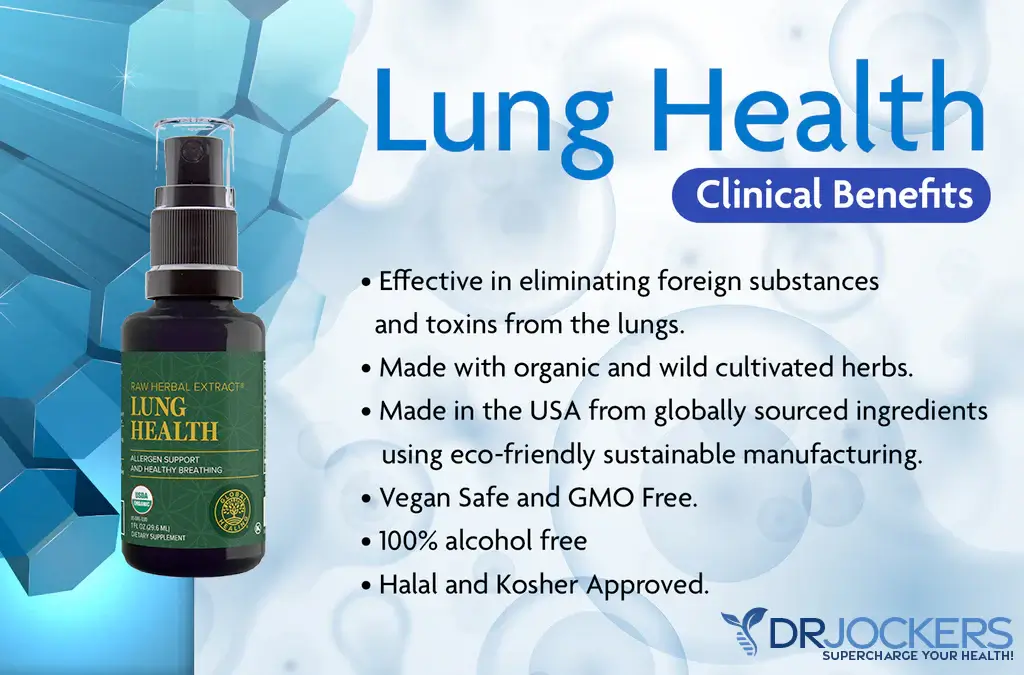 Laryngitis: Symptoms and Natural Support Strategies
Laryngitis: Symptoms and Natural Support Strategies
Laryngitis is a condition that causes inflammation of your larynx or voice box. It may occur for a variety of reasons, including infections, smoking, poor voice hygiene, frequent throat clearing, and dry coughs. Laryngitis can cause hoarseness, a weak voice, a loss of voice, sore throat, dry throat, dry coughs, and tickling of your throat. It can be a frustrating and uncomfortable condition. However, you can improve your symptoms with the help of natural support strategies.
In this article, you will learn what laryngitis is. I will go over the symptoms of laryngitis. You will understand the risk factors for laryngitis. I will explain the difference between laryngitis and epiglottitis. You will learn about diagnosis and conventional treatment options for laryngitis. Finally, I will offer my top natural support strategies to improve your health.
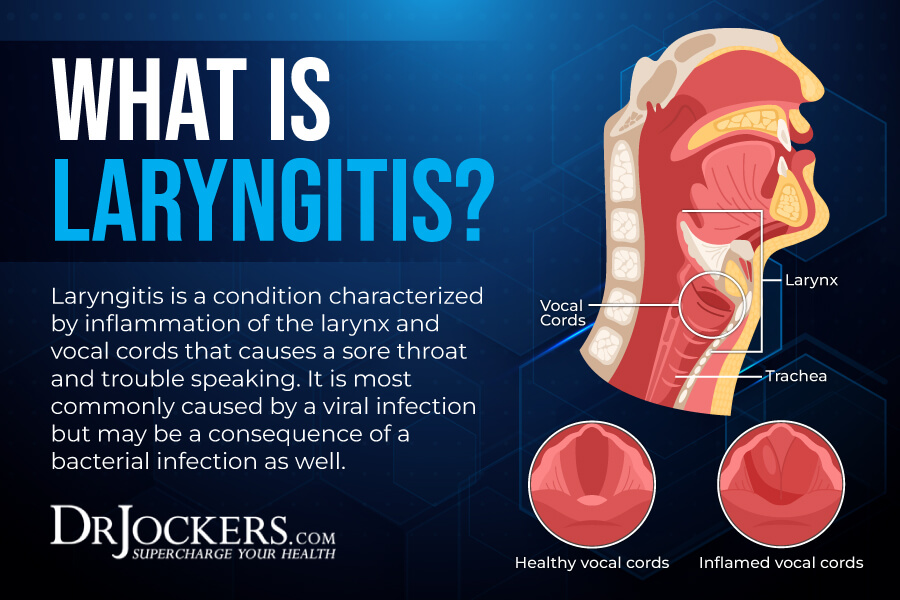
What is Laryngitis?
Laryngitis is a condition that affects your larynx or voice box. It occurs when your larynx is inflamed. You may develop laryngitis if your vocal cords are overused, infected, or irritated. Laryngitis is not the same as pharyngitis. The two conditions sound similar, but they are not the same.
Pharyngitis affects your pharynx, which is the area that begins behind your nose and ends at your voice box. Pharyngitis causes an inflamed pharynx. In layman’s terms, we call this a sore throat. Laryngitis, on the other hand, causes inflammation in the voice box, which is near your pharynx (1, 2).
Healthy vocal cords can open and close easily and create sounds through vibration. If your vocal cords are inflamed and swollen, your voice may sound hoarse, weak, or otherwise off. This is what happens if you have laryngitis (1, 2).

Symptoms of Laryngitis
In most cases, laryngitis is acute and short-term. It generally occurs due to something minor, such as a virus. Symptoms only last for a few weeks. In some cases, laryngitis can be chronic and long-lasting, caused by a more serious or chronic issue.
Symptoms of laryngitis may include:
- Sore throat
- Hoarseness
- Weak voice
- Voice loss
- Dry throat
- Dry cough
- Tickling feeling in your throat
- Rawness in your throat
- Mild fever in case of an infection
Risk Factors for Laryngitis
Risk factors for laryngitis may include:
- Viral infections
- Other infections, such as bacterial (strep throat) or fungal infections
- Smoking or vaping
- Using inhaled medications
- Poor vocal hygiene, including dehydration, voice abuse, or voice misuse
- Voice box inflammation due to sinus or mouth problems
- Irritants, including gastroesophageal reflux disease (GERD), and sinus issues
- Sore throat
- Dry throat
- Frequent throat clearing due to a feeling of phlegm or thick mucus in the throat
- Chronic dry cough
- Autoimmune issues, including polyangiitis (Wegener’s disease), granulomatosis, or pemphigoid/pemphigus
- Heavy drinking
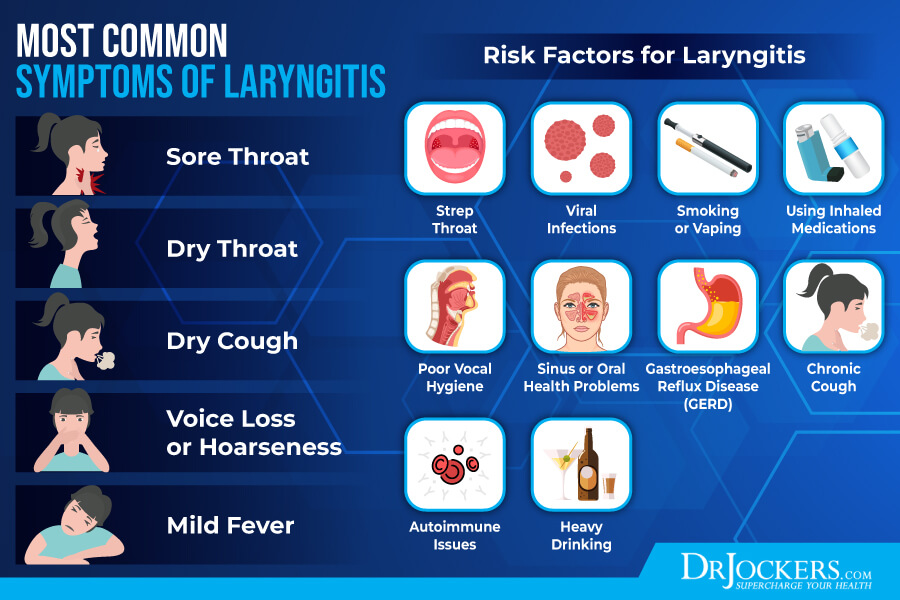
Laryngitis vs. Epiglottitis
Laryngitis and epiglottitis may share some symptoms, such as hoarseness and a sore throat, but they are not the same. Epiglottitis is a condition characterized by swelling and inflammation of the epiglottis, which is the thin flap of cartilage located at the base of your tongue. Epiglottitis is necessary to keep food and liquids from going down your trachea during swallowing.
Acute epiglottitis is a sudden and intense illness that causes issues with swallowing and breathing. It may be characterized by a sore throat, pain and difficulty swallowing, difficulty breathing, hoarseness, muffled voice, drooling, restlessness, irritability, and a fever.
Shared symptoms of laryngitis and epiglottitis include a sore throat, hoarseness, weak voice, or voice loss. However, the two conditions affect different areas of your throat. Laryngitis causes inflammation of your larynx or voice box.
The causes of laryngitis and epiglottitis may also be different. Epiglottitis is a bacterial infection, while acute laryngitis is generally caused by viral infections. As you know, there are also other issues that can lead to laryngitis (1, 2).
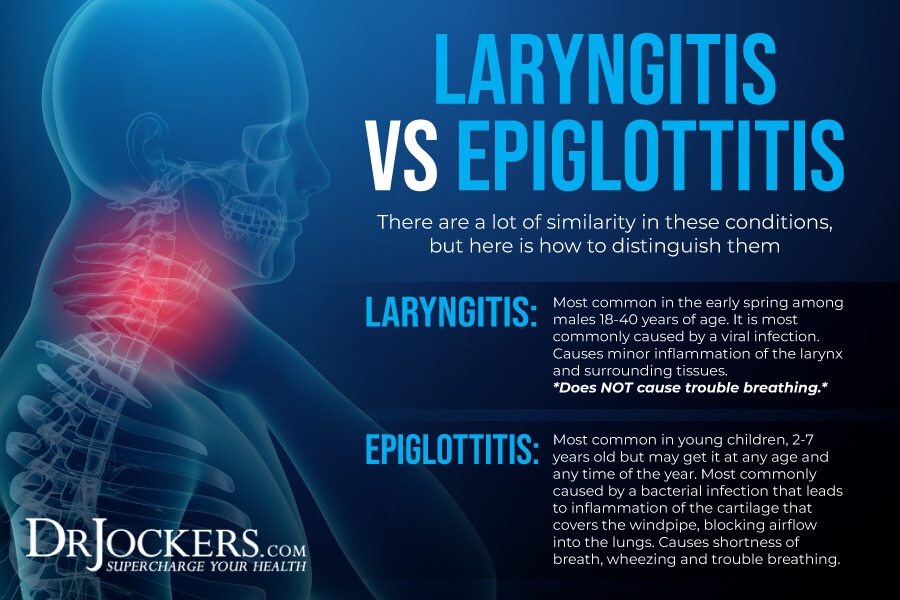
Diagnosis & Conventional Treatments
To receive the official clinical diagnosis of laryngitis, you have to experience symptoms, including changes or loss of voice, for at least 7 to 10 days. During your office visit, your doctor will review your medical history, go over your symptoms, examine your vocal cords, and listen to your voice.
They may refer you to an ear, nose, and throat specialist (ENT doctor). To aid the diagnosis, they may recommend a laryngoscopy. This means that they would insert a thin, flexible tube called the endoscope into your throat through your mouth or nose. The tube has a small camera at the end to allow the doctor to check your vocal cords. If they find anything suspicious, a biopsy sample may be needed.
Acute laryngitis from infections usually clears up on its own; otherwise, your doctor may recommend medication for the infection. You may be recommended oral steroids for inflammation. However, this is not recommended long-term. Your doctor will likely recommend avoiding irritants, such as tobacco products, that can trigger and worsen symptoms. You may be referred to a speech-language pathologist to improve your voice.

Natural Support Strategies
You may also support your throat and voice box health through laryngitis with some natural support strategies. Here is what I recommend.
Drink Warm Lemon Water
Lemon is a fantastic fruit. It offers an abundance of vitamin C, antioxidants, and immune-supporting benefits. A 2021 review published in Frontiers in Immunology has found that citrus fruits may help to reduce inflammation and boost immune health (3).
Drinking warm lemon water can soothe your sore throat, break up mucus from infections, and offer pain relief. Vitamin C provides support for your immune system and helps to fight infections that may cause acute laryngitis. Drinking warm lemon water may also help to hydrate your body, which is essential for immunity and overall health.
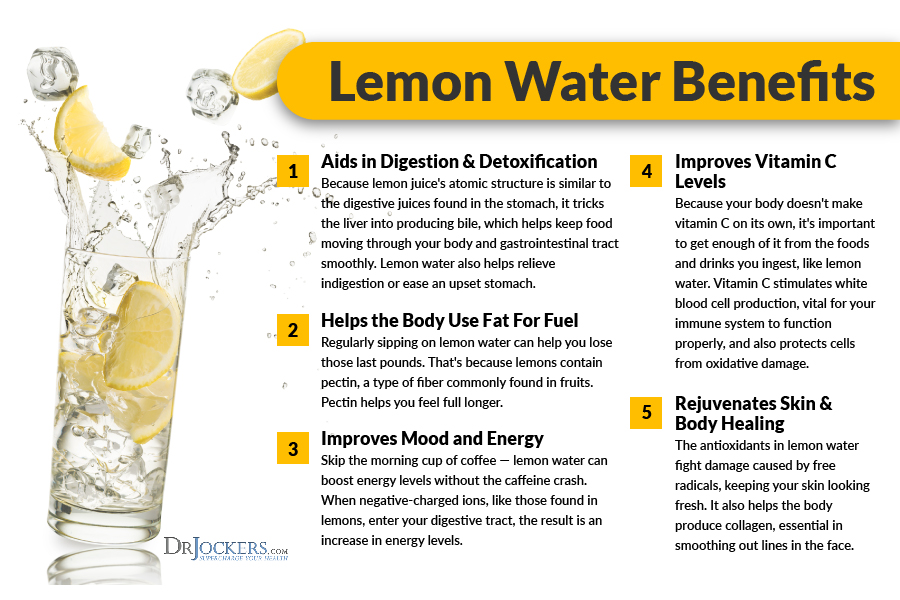
Consume Immune-Supportive Foods
If you are dealing with laryngitis, eating plenty of immune-supporting foods is critical for your recovery. This is especially important if you are dealing with acute laryngitis from an infection.
It goes without saying, but avoid inflammatory foods, such as refined sugar, refined oil, additives, artificial ingredients, gluten, conventional dairy, food allergens, food sensitivities, deep-fried foods, junk food, overly-processed foods, soda and sugary drinks, energy drinks, and alcohol. Instead, focus on immune-supportive, anti-inflammatory, antioxidant-rich, and nutrient-dense foods.
If you are dealing with infection-related laryngitis, consume plenty of immune-supporting greens, vegetables, fruits, and anti-inflammatory, immune-supportive herbs and spices. Eat light and choose lots of liquid nutrition, including bone broth and green smoothies. You may even try a bone broth fast for a few days to support your recovery.

There are a few immune-supportive foods and herbs I recommend to improve your health. I have written about these in this article if you want to learn more.
Lemon and limes: Lemon and limes are incredible sources of vitamin C and are fantastic for your immune health. A 2021 review published in Frontiers in Immunology has found that lemon and lime may help to reduce inflammation and boost immune health (3).
A 2019 review published in the Cochrane Database of Systematic Reviews has found that vitamin C may be very helpful for respiratory infections (4). You may squeeze lemon and lime juice on your salads or meals, or add them to warm water, tea, green juices, or green smoothies. You can learn more about the benefits of lemon and lime from this article.
Bone broth: Bone broth is made from brewed bones and connective tissues of cow, chicken, or even fish. It’s a delicious and nutrient-dense liquid that’s very high in minerals and vitamins. Thanks to all these micronutrients, bone broth may boost your immune health.
Bone marrow provides lots of benefits to bone broth as its raw materials for healthy blood cells and immune development. A 2021 study published in Medicina (Kaunas) has found that bone broth may help to reduce inflammation (5). It may also help to ease a sore throat and reduce related issues, such as laryngitis. I recommend adding bone broth to your recovery regimen. You may even try a bone broth fast for a day or two. To learn more about the benefits of bone broth, read this article.

Mushrooms: Mushrooms are abundant in antioxidants and immune-boosting benefits. Even your regular old portabella or button mushrooms from your grocery store are high in nutrients, but you may want to think about also trying some nutrient-rich medicinal mushrooms, including chaga, reishi, cordyceps, and turkey tail.
A 2014 review published in Integrative Medicine (Encinitas) has found that mushrooms may have immune-modulatory effects (6). Just add them to your morning smoothies, a cup of coffee, or stir-fry. I highly recommend my Paleo Stuffed Mushrooms recipe. You may learn about the benefits of chaga and reishi mushrooms here.
Garlic and onion: Garlic and onion can add a fantastic flavor to your dishes. They may also provide great anti-inflammatory and immune-supporting benefits. A 2021 review published in Pharmaceutical Biology has found that onions may have antioxidant, immune-supporting, and anti-inflammatory properties (7).
According to a 2012 study published in the African Journal of Traditional, Complementary, and Alternative Medicine, garlic may have immune-supporting effects (8). You may add garlic and onion to any of your soups, baked dishes, or salads.
You may also try a fire cider, an immune-boosting health tonic made with garlic, onions, horseradish, ginger, cayenne peppers, apple cider vinegar, honey, and sometimes other anti-inflammatory herbs. You may learn more about the benefits of onions here and the benefits of garlic here.
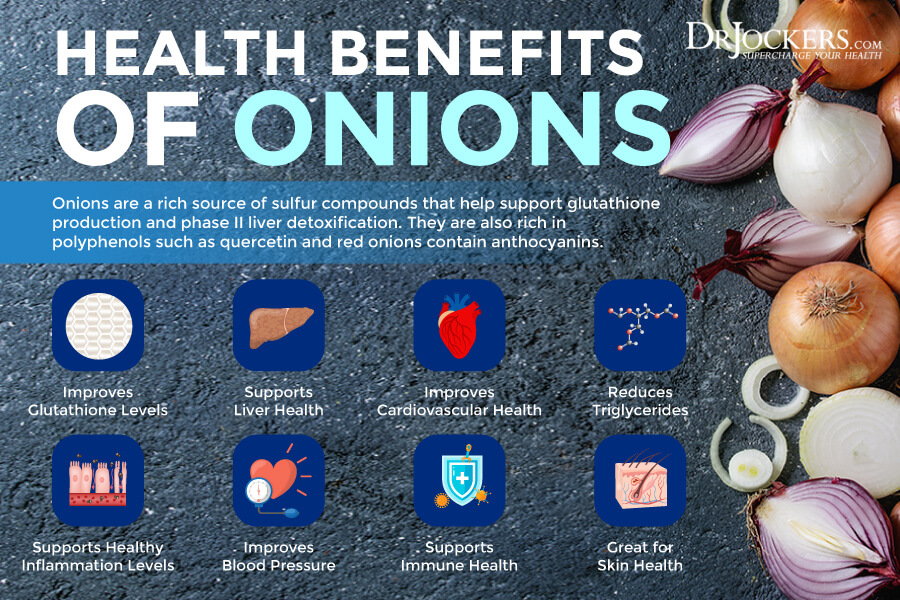
Olive oil: Olive oil is well known for its antioxidant, anti-inflammatory, and immune-supporting benefits. A 2010 study published in Nutricion Hospitalaria found that olive oil may benefit your immune health and may help to fight infections (9). I recommend that you choose extra-virgin olive oil.
Olive oil is fantastic when consumed raw. It provides a fantastic aroma and flavor to any salad dressing or dipping sauce. It is perfect for making stir-fries or baked vegetables as well. The very best olive oil is freshly pressed for the highest polyphenol counts, and you can get a $39 bottle of what my family and I use for just $1 here. You may learn more about the benefits of olive oil here.
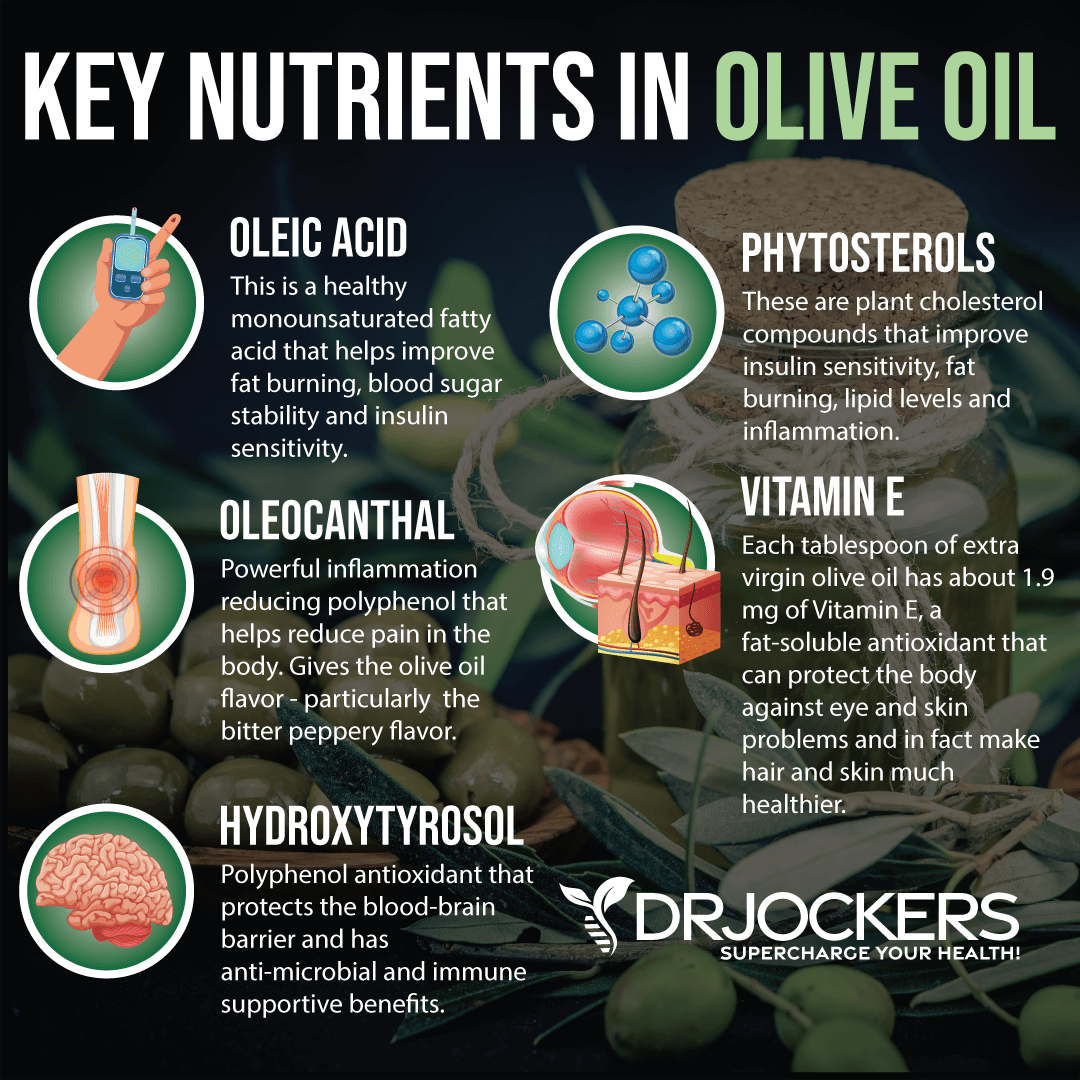
Apple cider vinegar: Apple cider vinegar is a type of vinegar that is made from the fermented, unstrained juice of crushed apples. Apple cider vinegar is rich in vitamin C, vitamin E, and antioxidants. It also serves as a great probiotic.
A 2017 study published in Fish & Shellfish Immunology found that apple cider vinegar may have immunomodulatory benefits (10). Add a spoonful of apple cider vinegar to your water in the morning to experience immune health benefits. You may also add apple cider vinegar to your salad dressings. You may learn more about how to use apple cider vinegar here.
Ginger: Ginger is one of the best immune-supportive and anti-inflammatory herbs out there. A 2013 review published in the International Journal of Preventive Medicine found that ginger may have anti-inflammatory and antioxidant effects (11).
You may flavor any of your soups, dishes, and salads with a bit of ginger. You can add it to your green juices and smoothies. Make ginger tea for further immune health boost by boiling 2 tablespoons of ginger root in 1.5–2 cups of water for 10–15 minutes. Add a tablespoon of lemon juice for further immune health support. You may also try my Keto Thai Ginger Chicken recipe.
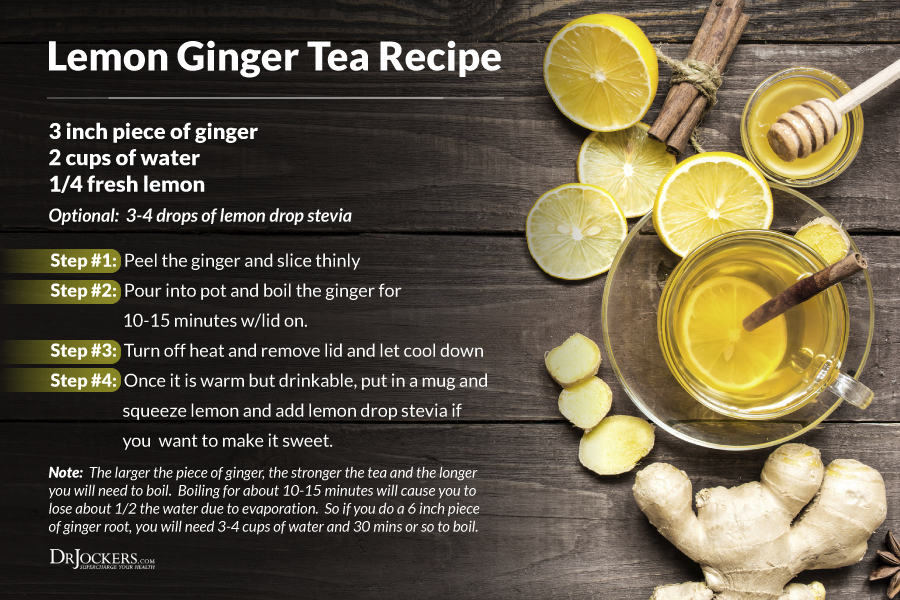
Gargle with Salt Water
If you are dealing with symptoms of laryngitis or throat infection, I recommend gargling with some warm salt water. Gargling with salt water may help to decrease inflammation and pain. According to a 2005 study published in the American Journal of Preventive Medicine, gargling may be helpful for upper-respiratory infections (12). A 2019 study published in Science Reports has found that gargling with warm salt water may help recovery from respiratory conditions (13).
I recommend mixing 1⁄4 teaspoon of pink Himalayan salt with 8 ounces of warm water. You may also add 1 teaspoon of hydrogen peroxide for extra anti-inflammatory support. According to a 2021 study published in Evidence Based Complementary and Alternative Medicine, hydrogen peroxide may offer support for upper-respiratory problems (14).
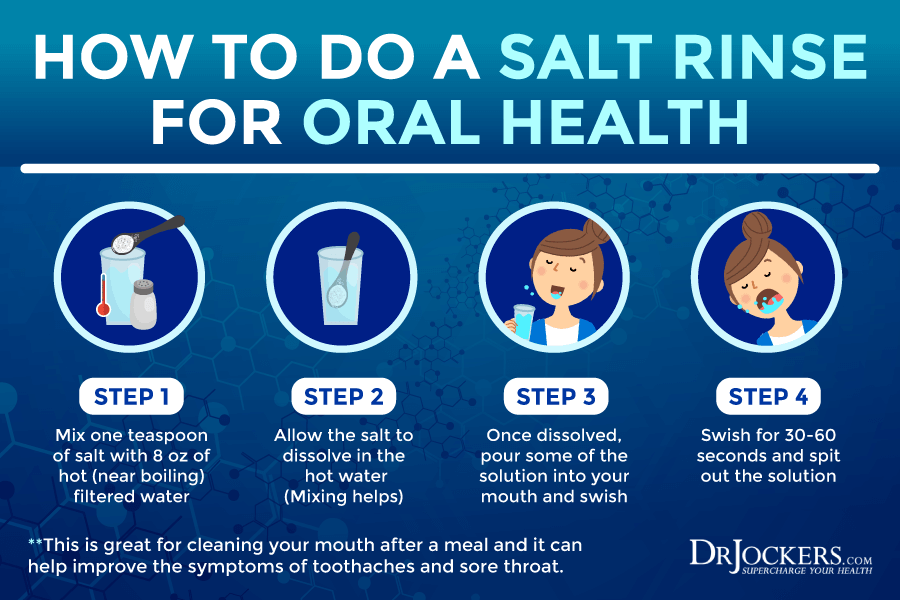
Gargle with Diluted Apple Cider Vinegar
I’ve already mentioned the potential benefits of apple cider vinegar for laryngitis. It is rich in vitamin C, vitamin E, antioxidants, and probiotic benefits. Drinking diluted apple cider vinegar or adding it to your salad dressings is a great idea. But you may also try garlic with apple cider vinegar to ease your symptoms.
A 2017 research published in Fish & Shellfish Immunology has found that apple cider vinegar may have immunomodulatory benefits (10). Gargling with diluted apple cider vinegar can help fight bacterial and viral infections while easing your symptoms. I recommend diluting a tablespoon or two of apple cider vinegar with one cup of water to gargle.
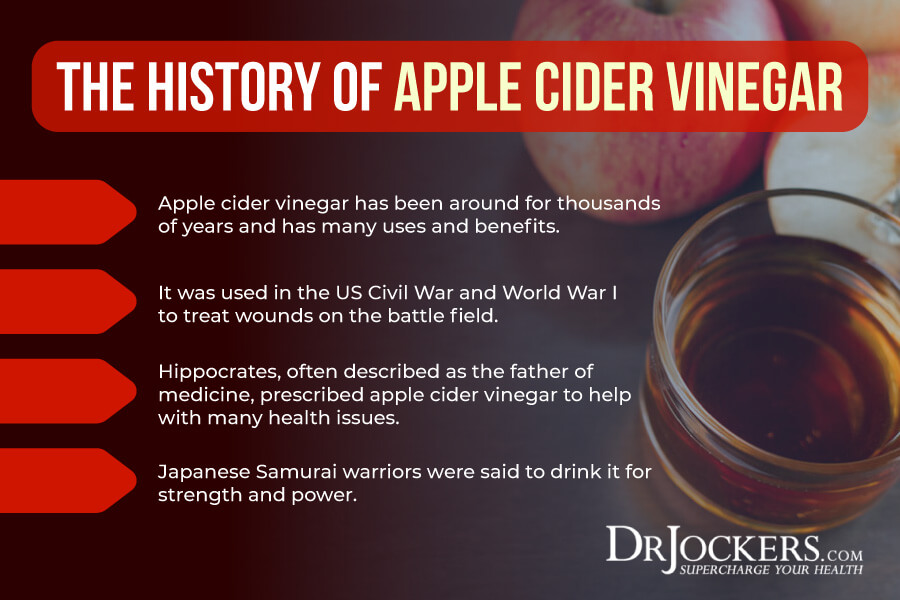
Consider Using Raw Honey
You may also consider using raw honey. Honey is a fantastic anti-inflammatory, antioxidant, and antimicrobial agent that may offer protection against respiratory infections. According to a 2021 review published in Integrative Medical Research, honey may support treatment and recovery for viral respiratory infections and associated symptoms (15).
Honey may help to reduce pain and discomfort associated with a sore throat, coughs, and infections. It may be beneficial for laryngitis. I recommend using organic raw honey, ideally from local beekeepers, for maximum benefits. You may add a spoonful of raw honey to your warm lemon water or herbal tea. You may also try a spoonful of honey as is or sprinkle a tiny amount of cinnamon on it for bonus anti-inflammatory and antioxidant support.
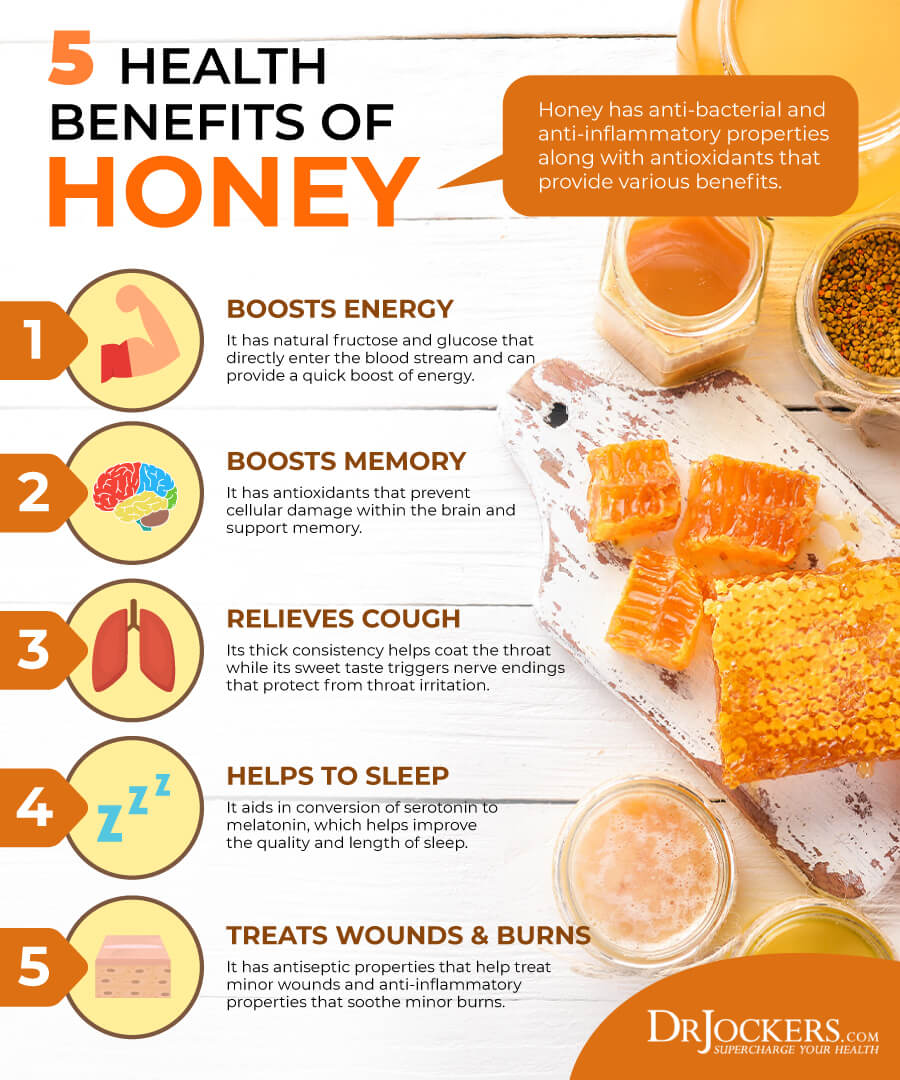
Nebulize Hydrogen Peroxide
A nebulizer is a piece of medical equipment that changes certain medications or therapeutic supplements from a liquid form to a mist that allows you to inhale it into your lungs. Nebulizing allows the quick administration of medication or supplements directly into your lungs.
Nebulizers have a mouthpiece or face mask to put over your face to inhale the mist through it. The therapeutic agent then goes straight into your respiratory system and lungs, exactly where you need it to take effect. Nebulizers are commonly recommended for people with asthma, various respiratory issues, and acute respiratory infections. In functional and holistic medicine circles, nebulizing with hydrogen peroxide is a common strategy used to improve respiratory symptoms and infections.
Hydrogen peroxide (H2O2) is a mild antiseptic agent. Hydrogen peroxide releases oxygen when applied to affected areas, which causes foaming. This helps to destroy bacteria, clean areas, and remove dead skin cells. According to Hidden Epidemic, a book by Dr. Thomas Levy published by MedFox Publishing in 2017, hydrogen peroxide may be helpful for acute viral respiratory infections (16).
A scientific article published by the Institute for Pure and Applied Knowledge (IPAK), Public Health Policy Initiatives (PHPI) has also recommended nebulizing with hydrogen peroxide for respiratory issues (17). You may learn more about nebulizing with hydrogen peroxide from this article.

Oil Pulling
I also recommend oil pulling. Oil pulling is a simple practice used in holistic health, especially in holistic oral care. Oil pulling may help to decrease bad microbes and inflammation in your mouth, lower the risk of infections, and ‘pull’ out toxins from your oral cavity. I generally recommend that you practice oil pulling every morning before brushing your teeth. However, if you have had laryngitis or any respiratory condition, I recommend that you try oil pulling every 2 to 3 hours.
I recommend using coconut oil for oil pulling. According to a 2019 study published in Heliyon, virgin coconut oil may have antimicrobial and immunomodulatory effects (18). Just squish a tablespoon of coconut oil in your mouth for about 20 minutes.
You may also add 1 drop of oregano oil or peppermint oil for antimicrobial benefits. According to a 2015 review published in Microbial Ecology in Health and Disease, oregano oil may have antimicrobial effects (19). A 2013 study published in the European Journal of Dentistry found that peppermint oil may also possess antimicrobial properties that may help to fight pathogens in the oral cavity (20).
Your time spent with oil pulling is fantastic for meditation, reflection, journaling, or grounding. Spit it out and brush your teeth carefully. Since the toothbrush you are using for oil pulling is brushing away toxins and oil, I recommend using a different toothbrush after oil pulling than at other times of the day.
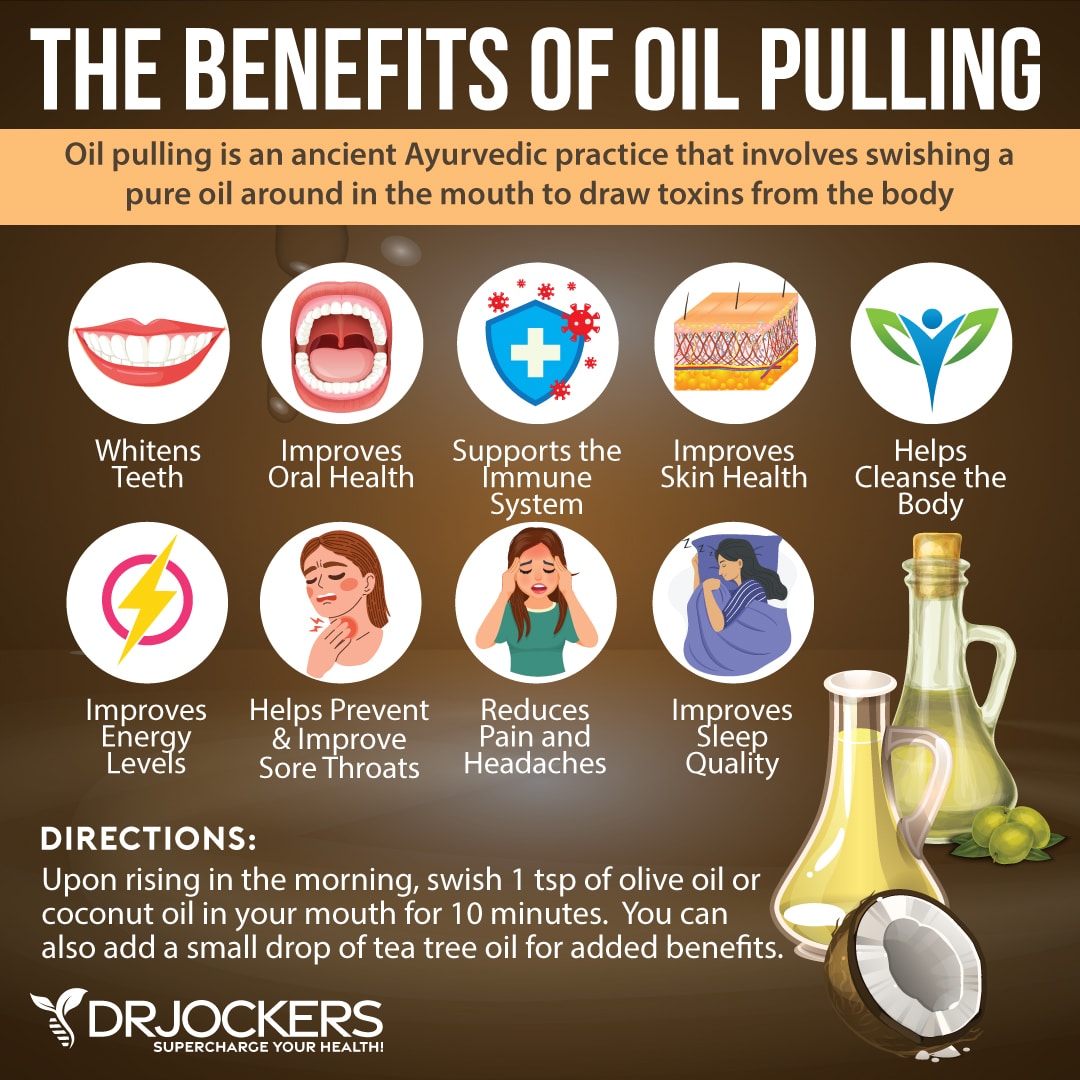
Replace Toothbrush
I recommend replacing your toothbrush when you first get symptoms of laryngitis, sore throat, or respiratory infections that may lead to laryngitis. Microbes can sit on your toothbrush and reinfect you or delay recovery.
Replacing your toothbrush helps to reduce the microbial load from the first few days of your infection when the microbial load is at its highest. Once you recover, I recommend replacing your toothbrush once again to help avoid reinfecting yourself.

Use Colloidal or Nano Silver
Silver has been used for its antimicrobial and other health benefits in folk medicine for centuries. It has been used to improve wounds, colds, respiratory issues, and infections. Today, silver is commonly used in holistic medicine, functional medicine, and alternative medicine for the same benefits.
We recommend using colloidal or nano silver supplements to receive the maximum benefits of silver. Unlike ionic silver and silver protein solutions, true colloidal silver doesn’t contain any protein or other additives. Instead, it is made out of nanometre-sized silver particles, creating a highly effective form of silver.
Colloidal silver is made by mechanically grinding metallic silver into tiny silver particles or by converting silver salts into small silver crystals using an electrochemical reaction. Nanoparticle silver, or nano silver, is the most advanced form of silver you can use. It is created by using nanotechnology.
One of the ways nanotechnology is making a big impact on healthcare is by making nanoparticle silver, or nano-silver. Nanoparticles are very small. This allows nano silver to be high-quality, pure, and toxin-free. When it comes to silver, even 0.01% impurity may lead to harm to the body, so you have to make sure the silver you are using is pure and safe. Using nanotechnology helps to control the purity of nanoparticle silver (21).
A 2013 study published in the Journal of Alternative and Complementary Medicine found that colloidal silver may have antibacterial properties. Using colloidal silver may help fight infections that can cause laryngitis and may support recovery (22).
I recommend and personally use Silver Spray™, which is nano silver, the most advanced form of silver you can find. It is a highly effective antimicrobial preparation composed of pure silver complexed with purified water made with Silver Sol Technology®. I recommend using it every 2 hours when you are awake. You may learn more about the benefits of colloidal and nano silver from this article.

Get Some Movement and Healthy Sun Exposure
To improve your health, I recommend getting some movement and healthy sun exposure. Movement helps to improve your immune health. Getting some sun may help boost your vitamin D levels, which is essential for your immune health.
A 2015 review published in the Progress in Molecular Biology and Translational Medicine has found that exercise may help to regulate the immune system (23). According to a 2021 study published in Clinical and Experimental Medicine, exercise may support the immune system and may be beneficial against respiratory infections (24).
According to a 2011 review published in the Journal of Investigative Medicine, vitamin D is critical for your immune system health (25). A 2021 review published in Dove Press has found that vitamin D deficiency may be common in respiratory infections and related laryngitis (26). Sunshine and supplementing with vitamin D may help
If you are dealing with infection-related laryngitis and feeling sick, don’t choose a hard workout. Your body still needs rest. Opt for light movement. Stretching, doing some light yoga moves, or going for a short, easy walk is more appropriate. If you are feeling unwell, just sitting outside and doing some light stretching while sitting is a great way to get some sunshine, vitamin D, and fresh air.
Always listen to your body. Don’t push it. However, it’s important that you try to stand up and stretch out regularly, instead of just lying down all day. Increase your activity slowly as you feel better. As you are feeling better, gradually increase your activity level and get back to a regular workout routine to strengthen your immune system and reduce the risk of future infections.

Optimize Sleep
Getting enough restorative sleep each night is absolutely necessary for your health, even if you are not sick. It helps to strengthen your immune system and your overall health. Good sleep is even more important if you are not feeling well. Sleep may allow your body to rejuvenate your cells and restore your health. According to a 2011 review published in Pflugers Archives, sleep is necessary and supportive for your immune health (27).
When you are not sick, I recommend getting 7 to 9 hours of restorative sleep a night. If you are dealing with laryngitis and not feeling well, you may need more sleep. Listen to your body’s needs and honor them with more sleep. If you need some extra rest or naps during the day, just take them.
To ensure a good sleep, avoid sugar, alcohol, heavy foods, and stress that can interfere with your sleep. Avoid electronics at least 2 to 3 hours before bedtime. Choose relaxing activities in the evening, such as taking a healing bath, reading, listening to music, doing crossword puzzles, journaling, meditation, or prayer. I recommend investing in a comfortable bed, mattress, bedding, and pillows, and using blackout curtains and an eye mask for better sleep.

Use an Infrared Sauna
I also recommend using infrared saunas for improved immune function and detoxification. An infrared sauna is a type of sauna therapy that utilizes infrared heaters that release infrared light. Your body will experience these infrared lights as heat as it gets absorbed through the surface of your skin. Infrared sauna therapy heats your muscle tissues and internal organs without heating the surrounding air. This process of heat may allow your organs and tissues to detoxify and eliminate toxins by perspiration or sweating.
The infrared wavelengths may help to enhance your immune health, kill pathogenic organisms, improve liver detoxification, and reduce stress. A 2018 review published in the Evidence Based Complementary and Alternative Medicine found that infrared sauna may help to improve immune function and reduce inflammation (28).
I recommend using infrared therapy even if you are currently not dealing with laryngitis and after recovering from an illness, too, to improve detoxification and immune health daily. If you are new to infrared sauna therapy, you can start with a short 5-minute session and build up over time to a 20-minute session or longer. I recommend using it in the morning and in the evening. To learn more about infrared sauna therapy, check out this article.

Herbal Teas
If you are dealing with laryngitis, drinking herbal tea can be very soothing for your sore throat. It may also help to reduce inflammation and offer immune support. I recommend drinking ginger tea or echinacea tea.
Ginger is a great herb known for its anti-inflammatory and pain-reducing benefits for various ailments. A 2013 review published in the International Journal of Preventive Medicine found that ginger may have anti-inflammatory and antioxidant properties (29).
Echinacea has been used as an herbal remedy to stimulate the immune system to fight off flu, the common cold, and other infections for centuries. It may help to decrease inflammation and pain while fighting harmful pathogens. A 2007 study published in the Journal of Medicinal Food found that echinacea may be beneficial for immune function (30).
I also recommend Throat Coat tea. This tea includes some powerful herbs, including ginger, licorice root, clove, and slippery elm. A 2021 study published in Phytomedicine Plus has found that licorice root may be beneficial for respiratory health and conditions (31). A 2021 study published in Molecules has found that clove may have immune-supporting effects (32). A 2017 study published in the Peer Journal has found that slippery elm, clove, ginger, licorice, and echinacea may help to fight bacterial infections in strep throat (33).
I also recommend that you add some lemon or lime juice to your tea to reduce inflammation and boost immune health (3, 4). You may also add some honey for anti-inflammatory and antimicrobial benefits (15).

Zinc
Zinc is a fantastic supplement for improving your immune health. According to a 2008 review published in Molecular Medicine, zinc may help to support your immune function (34). A 2019 study published in Pediatric Reports has found that zinc may help to fight respiratory tract infections (35). A 2016 study published in Nutrients found that elderberry may help decrease the length of respiratory symptoms during infections. (36).
Zinc is a powerful immune support compound. For optimal immune protection from cold-causing viruses, you need to ensure you are getting enough zinc (in a form your body can actually use) daily.
Your body produces a protein called human cytokine interferon alpha, whose primary role is to inhibit the replication of viruses. Zinc boosts your immune defense against viruses by potentiating this crucial protein.

NDF Immune is gentle immune support for lungs, throat, and more. NDF Immune is made with immune-modulating herbs, fruit concentrates, and adaptogenic botanicals used to help support the lungs, throat, and nasal passages.

Vitamin C Supplementation
Earlier in this article, I discussed the benefits of lemon and lime for immune health, inflammation, and respiratory issues (3, 4). Most of these benefits come from vitamin C. This is not news for most people. Chances are, you remember your mother giving you vitamin C tablets and orange juice when you were sick. I bet you still reach for the same as an adult.
This is not just an old wives’ tale, though. The benefits of vitamin C are well-researched and documented. Just as an example, according to a 2017 study published in Nutrients, vitamin C is essential for immune function (37). According to a 2018 study published in Biomedicine Research International, vitamin C may help reduce the length of the common cold and respiratory infections (38). It may be helpful for infection-related laryngitis.
I recommend consuming vitamin C-rich foods, including lemon, lime, oranges, mandarins, grapefruits, guava, strawberries, papaya, pineapples, kiwi, sweet green pepper, broccoli, and Brussels sprouts. It’s a great idea; however, it may not be enough, especially if you are sick. I also recommend taking a vitamin C supplement, such as Super C. I recommend 4 grams every 3 hours or around 20 grams daily or until bowel tolerance.

Vitamin D Supplementation
As you’ve learned earlier, vitamin D is incredibly important for your immune system and upper-respiratory health. According to a 2021 review published in Dove Press, vitamin D deficiency may be common in respiratory infections and related laryngitis (26). Supplementation may help. According to a 2011 review published in the Journal of Investigative Medicine, vitamin D is critical for your immune system health (25). I highly recommend this Vitamin D3/K2 Power.
I recommend taking 50,000 IU of vitamin D twice daily with meals for up to 3 days. After that, the typical recommendation is taking 1,000 IU per 25 lbs. of body weight will help you get your levels into a healthy range. You want to test your vitamin D levels at least 1-2 times each year and get your levels between 50-100 ng/ml. It has been hypothesized that a therapeutic level for major health conditions is going to be between 70-100 ng/ml.

Bonus: Throat and Lung Supportive Herbal Spray
Finally, I recommend using a throat and lung-supportive herbal spray, Lung Health, to support your recovery. Lung Health is a natural respiratory support product that uses a powerful blend of herbs and essential oils to encourage lung, sinus, and respiratory tract health.
A proprietary blend of the following ingredients helps promote total respiratory health and overall wellness, including lovage root, eucalyptus leaf, peppermint leaf, lungwort leaf, lemon balm leaf, orange peel, plantain leaf, chaparral leaf, elecampane root, lobelia flower, peppermint essential oil, and menthol.
- Lovage root: A 2019 study published in Molecules has found that lovage root may offer antioxidant and anti-inflammatory benefits (39).
- Eucalyptus oil: According to a 2008 study published in BMC Immunology, eucalyptus oil may benefit the immune system and the immune response (40). A 2006 study published in Phytotherapy Research has found that peppermint may have antiviral and antibacterial effects (41).
- Lungwort leaf: A 2003 study published in Phytomedicine has found that lungwort leaf may help to lower inflammation and related symptoms (42).
- Lemon balm: According to a 2017 study published in the Journal of Evidence-Based, Complementary, and Alternative Medicine, lemon balm may offer antioxidant benefits (43).
- Citrus peel: A 2014 study published in Biomedicine Research International has found that citrus peel, including orange peel, may support normal cytokine levels and may help to lower inflammation (44).
- Plantain leaf: A 2000 review published in the Journal of Ethnopharmacology has found that plantain leaf may have anti-inflammatory and immuno-modulatory benefits (45).
- Chaparral leaf: A 1996 study published in the Journal of Chromatography A found that chaparral leaf may possess some antiviral benefits (46).
- Elecampane root: A 2020 study published in the Journal of Ethnopharmacology has found that elecampane root may offer anti-inflammatory support for respiratory issues (47).
- Lobelia flower: According to a 2004 study published in Chemical Information, lobelia flower may be helpful for respiratory and lung issues (48).
- Menthol: According to a 2016 study published in Frontiers in Pharmacology, menthol may have anti-inflammatory effects (49).
Lung Health may be an excellent option for helping to clear upper respiratory infections and decrease swelling and soreness in the throat and sinuses. This lung support mix may help clear excess mucus and heal the throat and respiratory pathways. The liquid form is easy to use, and the 1 oz bottle is easy to travel with as well. I recommend 6 sprays 3 times a day for adults and children over age 12. For children between 6 and 12, I recommend 4 sprays 3 times a day, and between ages 3 and 6, 2 sprays 3 times a day. You may also use this to fight air toxins and allergies.
Final Thoughts
Laryngitis is a condition that causes inflammation to your larynx or voice box. It may occur for a variety of reasons, including infections, smoking, poor voice hygiene, frequent throat clearing, and dry coughs. Laryngitis can cause hoarseness, a weak voice, a loss of voice, sore throat, dry throat, dry coughs, and tickling of your throat. I recommend that you follow my top natural support strategies to improve your health.
If you want to work with a functional health coach, I recommend this article with tips on how to find a great coach. On our website, we offer long-distance functional health coaching programs. For further support with your health goals, just reach out—our fantastic coaches are here to support your journey.

Inflammation Crushing Ebundle
The Inflammation Crushing Ebundle is designed to help you improve your brain, liver, immune system and discover the healing strategies, foods and recipes to burn fat, reduce inflammation and Thrive in Life!
As a doctor of natural medicine, I have spent the past 20 years studying the best healing strategies and worked with hundreds of coaching clients, helping them overcome chronic health conditions and optimize their overall health.
In our Inflammation Crushing Ebundle, I have put together my very best strategies to reduce inflammation and optimize your healing potential. Take a look at what you will get inside these valuable guides below!
